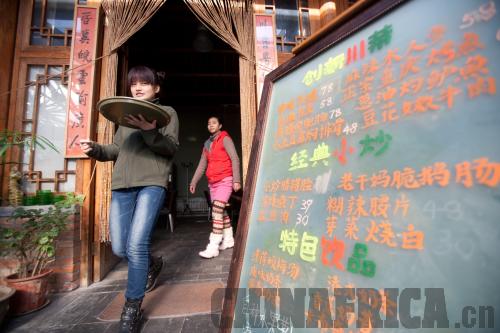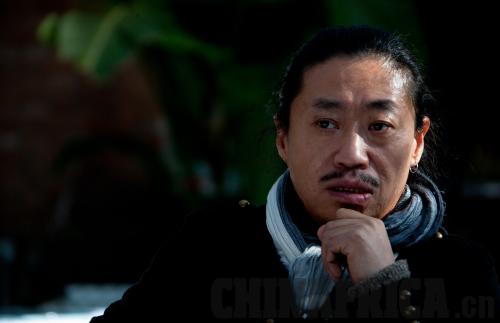|
 |
|
Most of the waiters and waitresses at the restaurant are deaf-mutes (WANG XIANG) |
At lunch time on a winter day, Mi Na Restaurant located in Song Zhuang Artist Village in eastern Beijing's Tongzhou District, is already full of customers. Unlike in other restaurants, one can never hear a customer shouting, as most of the waiters and waitresses are deaf-mutes who communicate with customers in sign language.
"I like to eat here because it's quiet and cozy, and I feel at home," Luo Yi told ChinAfrica after she ordered her meal using sign language. Luo, who lives nearby, first came to eat at this restaurant two years ago by a friend's recommendation. Since then, she became a frequent visitor.
"I came here to eat not because of its tasty dishes and good environment, but because of the waiters and waitresses. I can learn some sign language from them. Using this language is a special way to enter another world. I cannot help them much, but I feel eating here is a way to show support," she said, adding that she hopes this restaurant can keep running.
 |
|
Restaurant owner Su Qing (WANG XIANG) |
A brother's fate
Su Qing was once a filmmaker who focused on making documentaries about the lives of the deaf-mutes; he now runs this restaurant with his wife Mi Na. He believes running this restaurant is his fate.
Su has a special affinity for deaf-mutes, as his elder brother is a hearing impaired person. In his childhood, he often went to a school for deaf-mutes with his brother, where he learned sign language. With this skill, he not only communicated with his brother's schoolmates, but also became an interpreter for his brother and other family members.
Yet, on his tight budget, Su was unable to return home frequently after he left to work in another city far away from his hometown. He spent four years away from home - his longest time away from home - his older brother sat close to him and explained his dismay using sign language. When Su was away, he said, he could not communicate with other family members, as they don't know sign language.
His brother's disheartenment touched Su. For so many years, his middle-aged brother could not even communicate with his family members at home. "At that time, I was thinking that to let more people learn sign language, it should start from the families of those suffering hearing impairment," said Su. "And I also wanted to make a documentary which truly depicts their lives and thoughts, so that more people can better understand them, and society can show them more tolerance."
Su used to work as an advertising and TV program manager in a movie and television company in Chongqing, but he hoped to make his own documentaries one day. Under his wife's support, he came to Beijing and realized his dream. Since 2002, he has been involved in making documentaries about deaf-mutes. Among them, the White Tower won the Prix Premiere and a Special Mention at the 15th Marseille International Documentary Film Festival, and was also screened at many international film festivals.
Su's documentaries depict the real living conditions of deaf-mutes and the problems they encounter in everyday life. "I want to call for changes in the living conditions of this disadvantaged group through documentaries," said Su.
According to statistics from the China Disabled Persons' Federation, the hearing-impaired population in China is over 20 million. Education and employment are the two biggest problems they face.
The government has adopted a lot of incentives, such as a tax relief policy for companies that recruit a certain number of people with disabilities to work for them. Although some of them get salary every month, they still stay at home, as they cannot communicate well at work.
"This method is just like relief, and it cannot solve the employment problem," Su told ChinAfrica. "People with disabilities need to do some jobs that can bring their abilities into full play, so that they can find meaning in life through work." Su explained that it is for this reason that he opened this restaurant.
Inspired by Su's dedication, some of his friends have asked him to recommend deaf-mutes to work in their companies, but he only does so under the prerequisite that the employer is able to use sign language. "No sign language means no communication, and no communication means no giving and sharing between people. It is communication that brings people happiness and meaning in life, and it's more important than the job itself," said Su.
|